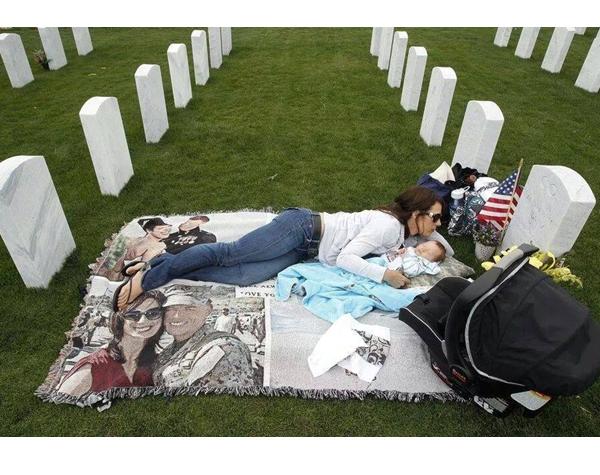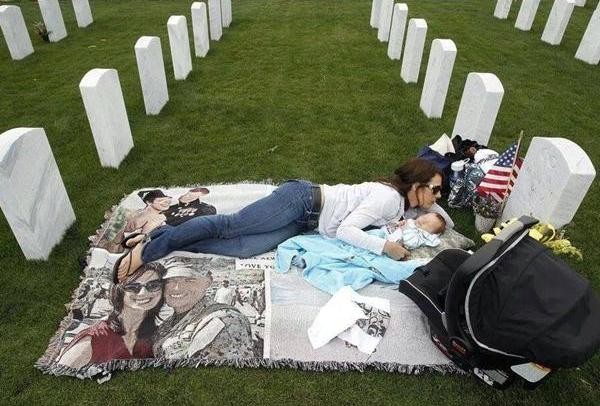Memorial Day is a time where Americans honor the fallen men and women who gave their lives in service to this country. The holiday also brings into focus an often forgotten demographic – bereaved military families. Indeed, the recent wars in Afghanistan and Iraq have unfortunately increased the number of single-parent military families. Although private and public organizations exist to assist bereaved families, due to the lack of consistent and coherent efforts, families are forced to deal with financial (and even psychological) instabilities, therefore, making it difficult for them to survive.
As of 2014, approximately 6,840 U.S. service members died in Operation Iraqi Freedom and Operation Enduring Freedom. [ref] “TAPS Fact Sheet & Statistics on Families of the Fallen Tragedy Assistance Program for Survivors (TAPS),” Tragedy Assistance Program for Survivors, accessed May 27, 2015, http://www.taps.org/uploadedfiles/taps/resources/documents/factsheet.pdf[/ref] For each active duty military loss, about ten people, on average, are significantly impacted. According to Scripps-Howard News Service, the U.S. Census Bureau data, and the Tragedy Assistance Program for Survivors (TAPS), a total of 68,360 family members have been significantly impacted by such deaths.[ref]Ibid[/ref] 3,760 of these people are widows or widowers, while 4,923 are children who lost a parent.[ref]Ibid[/ref]
At the immediate level, upon receiving news of a loved one’s death, the family will naturally feel intense sadness and loss. Children, in particular, may develop post traumatic stress disorder (PTSD) symptoms while experiencing traumatic grief. Beyond the sadness, single-parent households will also face a number of financial challenges as well. Although the Department of Defense (DOD) helps family cover funeral expenses, military pay stops following the tragedy.[ref] Bonnie Carroll, “The Financial Aftermath of Military Loss: Helping Families Build a ‘New Normal,'” The Huffington Post, June 8, 2012, accessed May 27, 2015, http://www.huffingtonpost.com/bonnie-carroll/military-death-benefit_b_1578808.html.[/ref] The surviving spouse must implement a new money management system immediately, or suffer with numerous unpaid bills, bankruptcy, and even lose their homes.[ref]Ibid[/ref] But these surviving spouses encounter a whole range of difficulties while securing a source of income. In fact, one in four military spouses are unemployed and actively seeking work. [ref]“Military Families Face Financial Challenges,” Al Jazeera America, accessed May 27, 2015, http://america.aljazeera.com/watch/shows/the-stream/the-latest/2014/3/5/military-familiesfacefinancialchallenges.html.[/ref]Those individuals who do find work earn twenty-five percent less than their civilian counterparts, on average, and relocate fourteen percent more than civilian families.[ref]Ibid[/ref]
Already, there exists a number of federally funded programs and private organizations that seek to provide a range of goods and services to single spouses and their children. TAPS, for example, is a nationwide not-for-profit organization that assists surviving family members, casualty officers, and caregivers. Specifically, TAPS also provides grief camps for children and teens and seminars for surviving adults. The National Alliance for Grieving Children also offers grief support services to all children, including bereaved military families. Located throughout the U.S., the organization also hosts workshops and symposiums to raise awareness and educate others on children’s grief. Besides offering much needed emotional support, programs like the Military Spouse Resource Center, established by the DOD, consists of a comprehensive database that helps spouses find training and employment, in order to support their families. The Navy Marine Corps Relief Society, in particular, provides financial assistance to all families, including bereaved families, in cases such as medical and funeral expenses, food, mortgage, and utility costs, etc.
Seeing as a how a number of organizations already exist, perhaps these groups should combine their resources, and work together, in hopes of helping a greater number of bereaved families. The Inter-Service Family Assistance Committee (ISFAC), for instance, is a voluntary military-community partnership that encourages service providers to network while connecting to family members, veterans, and wounded warriors, with local resources.[ref]”Inter-Service Family Assistance Committee,” Joint Services Support, 2014, accessed May 27, 2015, https://www.jointservicessupport.org/Documents/ISFAC.pdf.[/ref] To create an ISFAC, organizations may first want to gain leadership support by appealing to civic and military leaders. After identifying such prominent individuals, organizations may next want to invite these potential stakeholders to a town hall meeting.[ref]Ibid[/ref] Next, these organizations will need to survey the respected area for any bereaved military families, and recognize their needs. The organizations will then review their own resources, and work to satisfy and significant gaps. Creating ISFACs will enable these organizations to work more efficiently to address the needs of bereaved military families.[ref]Ibid[/ref]
Finally, according to the Center for the Study of Traumatic Stress at the Maryland-based Uniformed Services University of the Health Sciences, there is a lack of substantive research surrounding the repercussions after the death of a family member serving in the U.S. military. For this reason, perhaps Americans should publicize and support the “largest study ever of America’s military families.”[ref]”The National Military Family Bereavement Study,” The Uniformed Services University, accessed May 27, 2015, http://www.militarysurvivorstudy.org/information.php[/ref] Besides providing first-hand interviews, military families can also provide saliva samples that will be used for research to see if there is any correlation between genetics and the grieving process, along with levels of stress and depression.
Bereaved families have made the greatest sacrifice of all in the name of freedom. In turn, it is important that American citizens make every effort to not only comfort these grieving spouses, and their children, but to also give these families a chance for financial stability and future to make their loved ones, America’s fallen heroes, proud.
Take Action:
Encourage any bereaved individuals to participate in the National Military Family Bereavement Study to find a better way to help these individuals. You can also direct any bereaved families to the DOD’s comprehensive Service Organizations List, where many, if not all, helping organizations are named.





